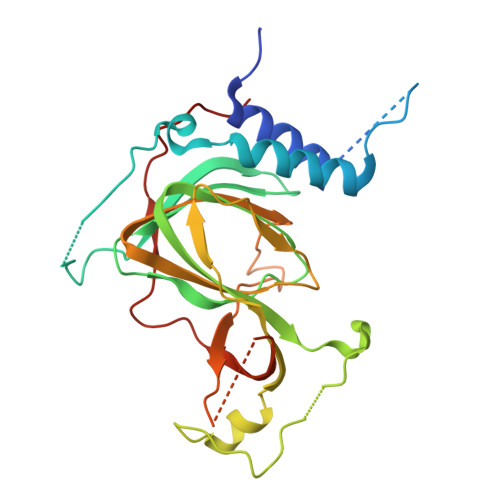Hydralazine inhibits cysteamine dioxygenase to treat preeclampsia and senesce glioblastoma.
Shishikura, K., Li, J., Chen, Y., McKnight, N.R., Keeley, T.P., Bustin, K.A., Barr, E.W., Chilkamari, S.R., Ayub, M., Kim, S.W., Lin, Z., Hu, R.M., Hicks, K., Wang, X., O'Rourke, D.M., Martin Bollinger Jr., J., Binder, Z.A., Parsons, W.H., Martemyanov, K.A., Liu, A., Matthews, M.L.(2025) Sci Adv 11: eadx7687-eadx7687
- PubMed: 41091880
- DOI: https://doi.org/10.1126/sciadv.adx7687
- Primary Citation of Related Structures:
9DMA, 9DY4 - PubMed Abstract:
Hydralazine (HYZ), a treatment for preeclampsia and hypertensive crisis, is listed by the World Health Organization as an essential medicine. Its mode of action has remained unknown through its seven decades of clinical use. Here, we identify 2-aminoethanethiol dioxygenase (ADO), a key mediator of targeted protein degradation, as a selective HYZ target. The drug chelates ADO's metallocofactor and can alkylate one of its ligands. The resultant inactivation stabilizes regulators of G protein signaling (RGS4 and RGS5) that ADO normally marks for proteolysis, explaining the drug's vasodilatory activity and comporting with observations of diminished RGS levels in both clinical preeclampsia and a mouse model thereof. Its inhibition of ADO suggested use of HYZ against glioblastoma (GBM); indeed, a single dose robustly senesces cultured GBM cells. By establishing ADO as a nexus for GBM and preeclampsia and connecting it to HYZ, the results create opportunities for directed tailoring of the old drug for new therapies.
- Department of Chemistry, University of Pennsylvania, Philadelphia, PA, USA.
Organizational Affiliation:



















